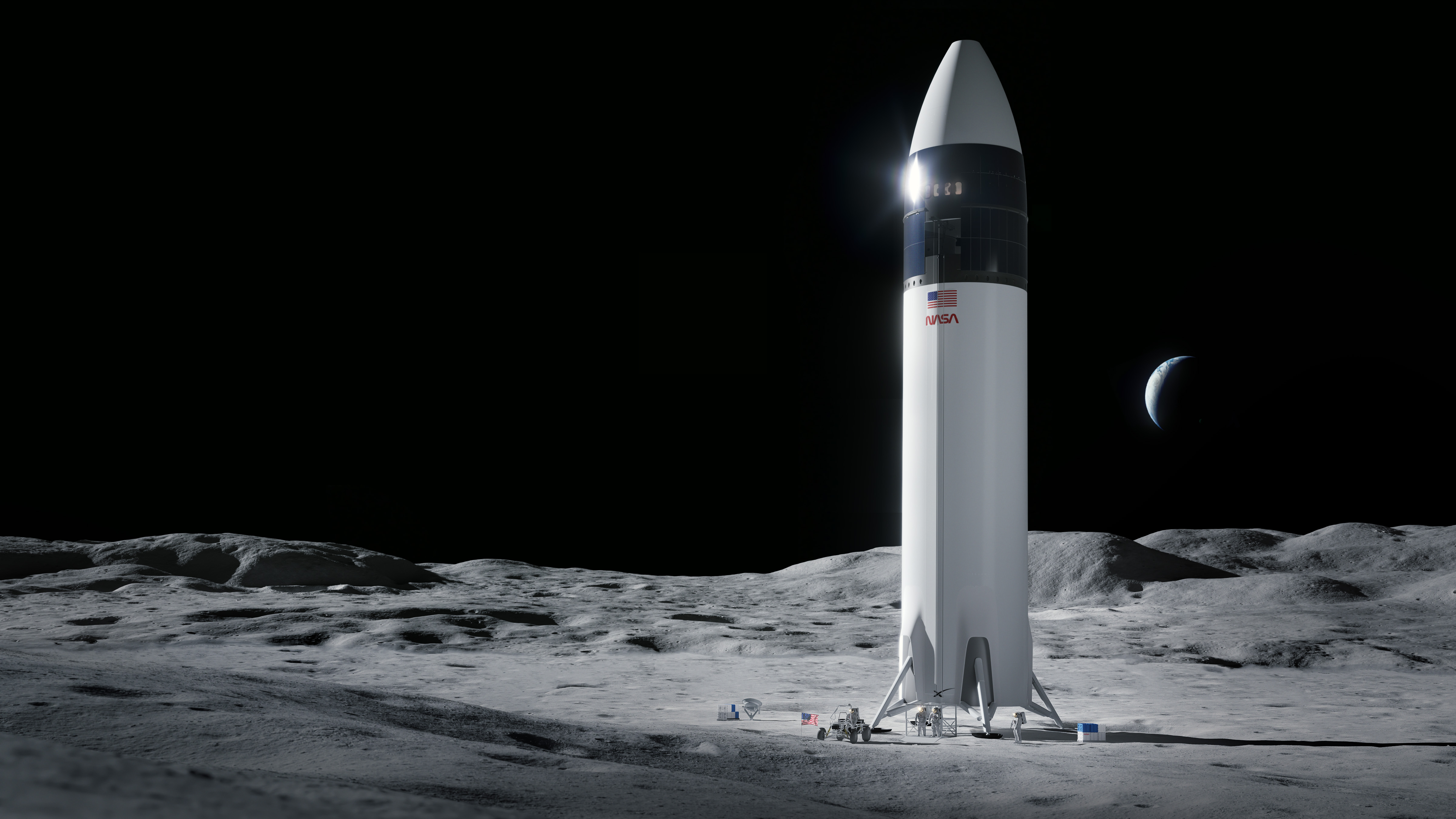Blue Origin and Dynetics file protests to GAO after SpaceX wins NASA's moon lander contract

Private spaceflight companies Blue Origin and Dynetics are both filing protests to the U.S. Government Accountability Office (GAO), in response to NASA's decision to make their competitor SpaceX the sole winner of a contract to build the lunar lander for the agency's Artemis program.
Earlier this month, NASA named SpaceX the sole winner of a contest between the three companies to develop and build the lunar lander that will put the next NASA astronauts on the moon with Artemis. NASA's Artemis program aims to return astronauts to the moon's surface by 2024, an ambitious timeline that was set by former President Donald Trump's administration and which has not been revised since President Joe Biden's administration has taken office.
On Monday (April 26) both Blue Origin and Dynetics filed GAO protests over the contract award, citing "flawed acquisition" for the program and "issues and concerns" with the award process.
Related: NASA picks SpaceX's Starship to land Artemis astronauts on the moon
"NASA has executed a flawed acquisition for the Human Landing System (HLS) program and moved the goalposts at the last minute," Blue Origin officials said in a statement emailed to Space.com.
"In NASA's own words, it has made a 'high risk' selection. Their decision eliminates opportunities for competition, significantly narrows the supply base, and not only delays, but also endangers America's return to the moon. Because of that, we've filed a protest with the GAO," the statement says.
Dynetics is also unhappy with how the process for the HLS lunar lander contract went, revealing in a statement shared by SpaceNews senior writer Jeff Foust on Twitter that "Dynetics firmly believes our HLS design offers great potential to contribute toward NASA's HLS program goals and we believe NASA's initial plan for continued competition remains the best approach to ensure program success."
Get the Space.com Newsletter
Breaking space news, the latest updates on rocket launches, skywatching events and more!
The "continued competition" that Dynetics is referencing is the idea that NASA was originally planning on choosing two of the three competitors for the contract, to continue the competition and have a backup lander design. It came as a surprise to some when NASA chose just one of the three companies for the contract instead of two.
"Dynetics has issues and concerns with several aspects of the acquisition process as well as elements of NASA's technical evaluation and filed a protest with the GAO to address them. We respect this process and look forward to a fair and informed resolution of the matter," the company said, adding that this would be the only comment they would make on the matter.
Blue Origin also took issue with the fact that NASA chose just one instead of two competitors for the contract. In a redacted, public version of its protest document, emailed to Space.com, Blue Origin states that "During the proposal preparation and submission process, NASA had indicated an overriding intention to make two awards, but due to perceived shortfalls in currently available and anticipated future budget appropriations, it made only the award to SpaceX."
The protest document explains that this decision by NASA, according to Blue Origin, eliminated competition and effectively solidified all current and future crewed lunar landing opportunities for SpaceX, not leaving room for others.
The company also alleges in their protest that NASA's "evaluation process and award decision fails to comply with Federal procurement statutes and regulations and should be set aside."
The document goes on to list the reasons why the agency's decision to solely choose SpaceX is "flawed," including the assertion that the decision didn't allow the other two contestants to "meaningfully compete" and that both the process and decision conflicted with Broad Agency Announcement (BAA) rules and practices, among other reasons.
Email Chelsea Gohd at cgohd@space.com or follow her on Twitter @chelsea_gohd. Follow us on Twitter @Spacedotcom and on Facebook.
Join our Space Forums to keep talking space on the latest missions, night sky and more! And if you have a news tip, correction or comment, let us know at: community@space.com.

Chelsea “Foxanne” Gohd joined Space.com in 2018 and is now a Senior Writer, writing about everything from climate change to planetary science and human spaceflight in both articles and on-camera in videos. With a degree in Public Health and biological sciences, Chelsea has written and worked for institutions including the American Museum of Natural History, Scientific American, Discover Magazine Blog, Astronomy Magazine and Live Science. When not writing, editing or filming something space-y, Chelsea "Foxanne" Gohd is writing music and performing as Foxanne, even launching a song to space in 2021 with Inspiration4. You can follow her on Twitter @chelsea_gohd and @foxannemusic.









